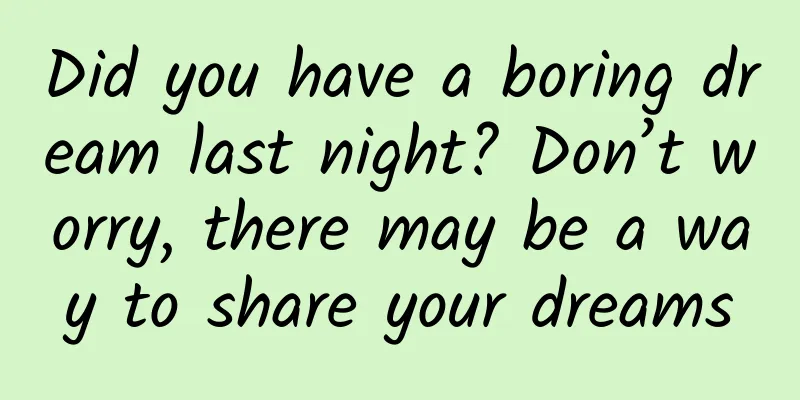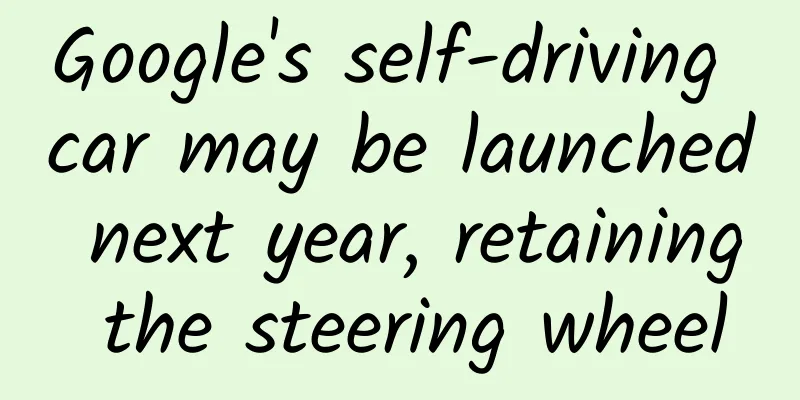Did you have a boring dream last night? Don’t worry, there may be a way to share your dreams

|
© Armada International Leviathan Press: Sharing an objective object, such as a movie, a song, or a dish, is done in a clear way. Objective means that it will not be interfered with by subjective will. However, the feeling of a movie or a dish is subjective. Fortunately, the feeling is formed after the sharing behavior is completed. But the paradox of dreams is that they are more like a subjective experience than an objective thing. After waking up, I can describe the dream I just had to others using various means such as words and images, but I cannot fully express my feelings. This is like the question that is often raised: Is the red I see the same red as the red you see? People always say other people's dreams are boring, but what if it's actually a technical issue? It’s all too easy for language to misrepresent, stumble, or be misinterpreted, whether intentional or not . If you could show someone your dreams—literally, pull them out of your head and project them onto a nearby screen—then maybe they’d roll their eyes and turn away the next time they hear you recount a dream. Movies related to dreams have naturally become the eternal theme of science fiction movies. Now, as a large number of science fiction plots are approaching reality (or have become reality), we have reason to expect whether humans will soon experience those science fiction movie plots related to dreams. For this reason, we contacted a group of experts, hoping to get an answer. © Giphy Susana Martinez-Conde Professor of Ophthalmology, Neurology, Physiology, and Pharmacology whose research connects perception, oculomotor, and cognitive neuroscience In theory, it is possible to access the content of someone's dreams - including visual content, emotional content - or to read or provide relevant data support. Our dreams are just neural activity in the brain. There is nothing special about it and it does not affect any emotions or perceptions we have when we are awake . There is no neural network or brain area that is only active when we dream but remains silent when we are awake. The biggest limitation does not come from technology, but from the fact that we still cannot crack the code of neural networks. We still don’t know how conscious experience is encoded in the brain . What limits us from sharing dreams today also limits us from downloading consciousness, such as saving it in a computer. If we can’t really understand the basis of neurophysiology, then the speed of technological progress is meaningless. Today we can’t even really crack what experience is. There is no shortage of theoretical hypotheses in the field, but we still lack fundamental consensus. For example, whether the prefrontal cortex is critical to conscious experience is still a hotly debated topic. We are still a long way from that day - I think I'm talking decades away, not just years. But if one day we really understand the mechanism of consciousness from a biological perspective and have the corresponding technology, then there is no reason to prevent humans from downloading consciousness into a computer and achieving immortality - or, by the way, sharing dreams. © Alain Destexhe Robert Stickgold Professor of Psychiatry at Harvard Medical School, whose research focuses on sleep “Forever” is a pretty long time, but I think the answer to that question, at least for everyone reading this, is, “Bah, no way.” Think about it this way. It is almost impossible to share your thoughts with others just by speaking. Because the moment you open your mouth, you have 20 new thoughts, and you can only choose one to express. But all these thoughts exist in your mind and are part of your "mind". The "mind" that scholars can currently understand is limited to putting fully awake people in functional magnetic resonance imaging machines and analyzing whether they interpret abstract images in their hands as faces or tools. From a more philosophical point of view, your thoughts and your dreams are always embedded in your overall memory network and life experience . You can't just "walk in someone else's shoes" as the saying goes, you can't just apply that position and go shopping as if nothing happened. © Rebloggy Adam Hair Horowitz Research Assistant at MIT Media Lab, whose research focuses on brain science Like many other questions in science, this one is a door to many more. In order to share dreams, we first need to define dreams, to draw clear boundaries around the dream thing - is the thing that defines dreams visual? When we try to share dreams, is the thing we are sharing visual perception? If so, then in a shared dream, when the two of us see a portrait of my mother, does this image satisfy the concept of "mother" in the shared dream? I think not. Dreams are like an alloy of memory. Dreams are our inner exploration of various meanings and significances. Dreams are various concepts embedded in each person's private context . Therefore, the same sensory stimulation will bring completely different experiences in the minds of two people. In other words, we can doubt whether we watched the same movie as the person next to us, even if we were awake and sitting on the same sofa at the time... This is a very troublesome question from a philosophical point of view. But from a practical point of view, it's not that complicated. We have made great progress in some areas, such as using brain imaging technology to decode visual signals in dreams. Other studies have shown that we can communicate in lucid dreams, using eye movements to achieve certain levels of communication across consciousness. And research from MIT's Fluid Interfaces Group has shown that we can create specific atmospheres and themes in our dreams. On the surface, we are narrowing the gap between the private space of dreams and external observers. But I think this gap will still exist in a form similar to Zeno's paradox, because even if scientists create objective tools to capture, observe, and create dreams, "personal experience" will continue to be there to puzzle scientists - if we want to share a person's entire dream, we can't get around the problem of sharing this person's entire consciousness and experience. © Giphy T.W.C. Stoneham Professor of Philosophy at New York University, whose research focuses on dreams RA Davies Research Assistant, Department of Philosophy, New York University In addition to the simple meaning that we can talk and exchange dreams with each other, shared dreams also contain two interesting meanings: first, having the same dream at the same time, that is, "dreaming together"; second, observing the dreams of others, perhaps through some advanced technology, that is, "scanning dreams." We can find examples of co-dreaming in some contemporary African cultures, where one person can "dream for another" and even establish a "triangle", where one person's dream with certain specific information is passed on to another person through the medium of the dreamer. Similarly, this kind of dreaming also appears in ancient civilizations, such as Mesopotamia, Ancient Egypt, and Ancient Greece, including another example of simultaneous dreaming, where a patient and a priest would dream the same important dream on the same night (which was considered a symptom). In the prevailing view of contemporary Western culture, sharing dreams in this way seems impossible, except as a result of coincidental dreams, suggested dreams, or the scanning of a dream. According to this view, dreams are essentially a personal and private experience (during sleep) that can currently only be shared through communication (during waking hours): the experience itself occurs independently. © Giphy Our research shows that these popular Western views of dreams are wrong. They don’t go far enough to explain common sleep phenomena, such as why precognitive dreams can alert us to alarm clocks in advance, or why low-level perceptions and inner feelings can be woven into dream content, or even why common foods can trigger nightmares. Contrary to popular Western views, we believe that dreams are primarily derived from a variety of sources that people are exposed to while awake—cultural influences, social influences, physical sensations, as well as cognition and insight. In our view, there is no inherently private personal experience underlying people’s reports of dreams. If our research is correct, scanning a dream won't reveal much about the dream. We predict that when we scan a dreamer's brain, the information we get will only be loosely related to the dreamer's report of the dream. However, another kind of shared dreaming is possible. In principle, in order to induce a "similar" dream in multiple sleepers, researchers may need to try to induce the same physiological and environmental changes while these dreamers are asleep. But differences in age, health, diet, social factors, cultural associations, etc. may still induce very different content in dreams, so the researcher may need to choose the experimental participants extremely carefully. By Daniel Kolitz Translated by Roronoa Zoro Proofreading/Jiro Akutagawa Original article/gizmodo.com/will-it-ever-be-possible-to-share-dreams-1845621197 This article is based on the Creative Commons Agreement (BY-NC) and is published by Roronoa Zoro & Akutagawa Jiro on Leviathan The article only reflects the author's views and does not necessarily represent the position of Leviathan |
<<: Why did trilobites become the "top stream" among ancient creatures?
>>: I brush my teeth every day, but why does it still hurt?
Recommend
National Day brand marketing tactics, take it and you’re welcome!
National Day is coming, are you ready for your ma...
What is the correct way to take advantage of the college entrance examination hot spots?
The college entrance examination every year is an...
Which CDN is the fastest for server rental configuration?
To solve the server speed problem, there is not o...
WeChat marketing precise traffic generation techniques and methods! How to attract targeted fans on WeChat?
I have collected some learning materials on Inter...
Compared to Jobs, Apple under Cook is more and more prone to delaying its delivery
The touch and shock that Jobs brought to us are i...
Apple iOS 15 leak summary: In addition to new icons, new lock screen, new notifications, there are 3 major changes
If you are a qualified Apple fan, even if there a...
2019 Advertising Monetization Insights Report!
In this article, we will continue to provide you ...
What are the functions of WeChat Decoration Mini Program? How much does it cost to make a house decoration mini program?
With the slowdown of real estate, related industr...
Nearly 10 million movie sources! Coocaa U55 10-core 4K test
As the National Day approaches, major TV manufact...
Rationally operate in-site advertising to maximize value
For e-commerce operators , the most troublesome t...
Did you skip brushing your teeth after dinner? Beware of bad breath tomorrow morning!
When you are lying in bed getting ready to fall a...
Virtual data is needed at the end of the year, and this is another project that can earn 200 yuan a day!
In recent days, I suddenly had a deep understandi...
The extension of train ticket pre-sale has caused complaints from the public, and experts say it shows more scientific freedom
With the introduction of a new policy for train t...
The 4 levels of training for software engineers in Silicon Valley
I'm a young, educated, white guy. I'm ver...
6 tips to quickly improve UI design effects
Editor's note: When designing a UI, there are...









